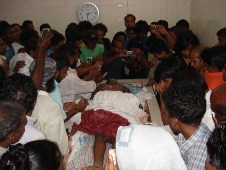The High Court has upheld a Criminal Court verdict acquitting a police officer of charges over assaulting an inmate in 2007, who was later found dead floating in Male’ harbour.
Corporal Ahmed Shah (Haa Dhaal Vaikaradhoo, Prim Rose) was accused of assaulting inmate Hussein Solah (Seenu Hithadhoo, Naazukeege) on April 12, 2007, three days before Solah was found in the harbour near the Atolhuvehi Detention Centre in Male’.
Shah was prosecuted on request of the Human Rights Commission of Maldives (HRCM), which obtained witness statements from three detainees who claimed Corporal Shah assaulted Solah in custody.
A seven-month investigation by the HRCM found that there was “not enough evidence to say for certain that Solah was [ever] released from custody.”
Police denied any wrongdoing and claimed Solah was released on April 13, informing HRCM that the inmate was suicidal and exhibited symptoms of heroin withdrawal.
In November 2009, more than a year after charges were pressed against the police corporal, the Criminal Court ruled that Shah was not guilty on the grounds that the witness statements were not sufficient evidence for a conviction.
The court noted that as Corporal Shah was in charge of the jail at the time, the witnesses were likely to be prejudiced against the senior officer.
Following the verdict, Head of the HRCM Legal Department Mohamed Shafaz Wajeeh told Minivan News that the court had a set a precedent of not considering witness statements from detainees without corroborating evidence.
Shafaz said he believed the case represented progress as it had been the first time such charges were pressed against a serving police officer.
The state however appealed the Criminal Court verdict at the High Court, which ruled (Dhivehi) yesterday that the verdict could not be overturned as the prosecution was unable to prove guilt beyond reasonable doubt.
History
 Hussein Solah, 27, was arrested on drug related charges in Hithadhoo on April 9, 2007 and brought to Male’. Police claimed he was released on April 13, but he did not contact family or friends, and was found dead in the harbour outside the detention centre on the morning of April 15.
Hussein Solah, 27, was arrested on drug related charges in Hithadhoo on April 9, 2007 and brought to Male’. Police claimed he was released on April 13, but he did not contact family or friends, and was found dead in the harbour outside the detention centre on the morning of April 15.
In January 2008, the HRCM requested criminal charges be filed against Corporal Shah, based on its findings and three witness statements.
In June 2009, the HRCM expressed concern that the case remained stalled at court as no hearings had been held for a year at the time.
Deputy Prosecutor General Hussain Shameem told Minivan News in June 2009 that a total of three hearings were conducted by the Criminal Court since March 2008.
At the last hearing on October 21, 2008, said Shameem, the issue of transferring proceedings to a court house near the Hathifushi low risk jail for a witness who was serving a sentence there was discussed.
HRCM Media Official Jeehan Mahmood, currently a member of the commission, told Minivan News at the time that the HRCM considered the case a custodial death.
A police media official meanwhile confirmed that Corporal Shah was serving in the police force and had not been suspended.
Under normal procedure, he said, a police officer who had a complaint filed against him or was involved in an ongoing court case would be suspended.
“But this is the Human Rights Commission’s allegations and it’s based on witness statements from three prisoners,” he said. “They don’t have any other evidence besides that.”
Waiting for justice
The discovery of Hussain Solah’s body sparked protests in the capital and Addu by the Maldivian Democratic Party (MDP).
Former President Mohamed Nasheed, then-chairperson of MDP, was beaten and arrested by police near the Aasaharaa cemetery in Male’ on April 15, 2007, the day Solah’s body was found in the harbour.
Solah’s family meanwhile rejected the findings of a postmortem conducted in Sri Lanka, which showed that the cause of death was drowning.
On April 28, Solah’s body was buried in the Aasaharaa cemetery without the consent of the family.
Speaking to Minivan News in June 2009, Hassan Zareer and Waheeda Ahmed, Solah’s parents, said they were still waiting for justice for their son’s “murder”.
Zareer said police called on the night of April 13, 2007 and said his son was going to be released.
“When the HRC checked the cell they found his bag, his clothes and a chit that he had with him,” Zareer said.
Zareer said he was convinced that his son was killed by police.
“I was surprised because it was a holiday and the court usually doesn’t finish cases that soon,” he said.
Police asked him where Solah should be sent to in Male’ and he told them to send him back to Addu.
Zareer found out his son was dead when he saw the news on TV on April 15, he said.
He added he did not accept the explanation from police or the post-mortem conducted in Sri Lanka.
Further, he referred to security cameras outside the detention centre, which police could have used to prove that Solah was released.
“We just want to know who is responsible,” said Zareer. “We don’t want money or anything like that.”
The family was planning to submit a petition to parliament requesting an inquiry into the death.
“I think about it all the time. It is in my heart every day,” said his mother.